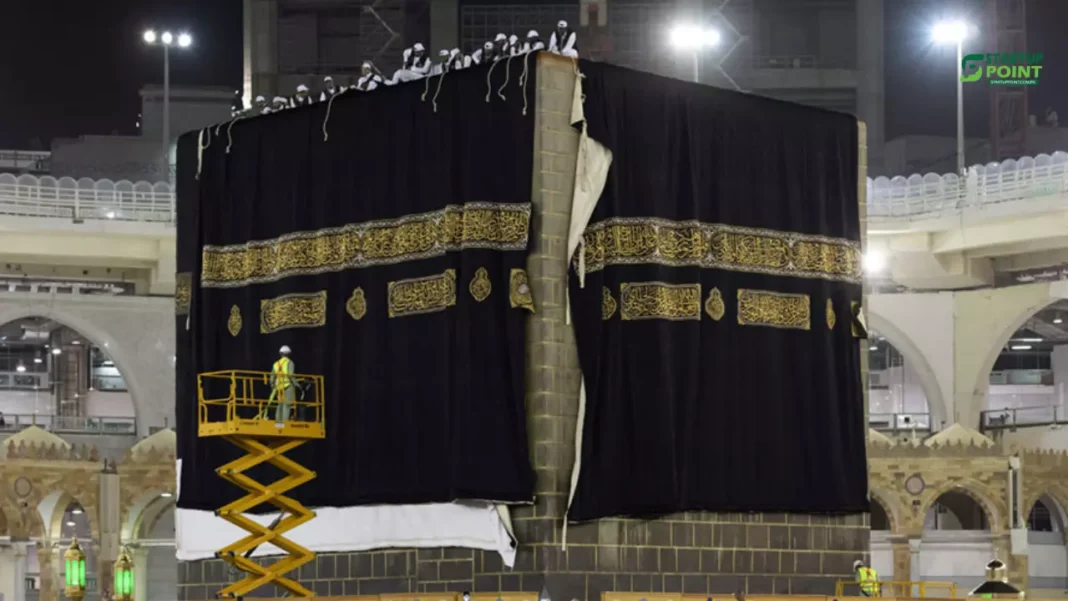Each year, a momentous occasion unfolds at Masjid al-Haram in Saudi Arabia on Muharram 15 (August 2). It is the time for the revered Ghusl-e-Kaaba ceremony, conducted after the Fajr prayers. Leading this sacred practice is the esteemed Makkah’s Governor, Prince Khalid al-Faisal.
The essence of the ceremony lies in the purification of the Holy Kaaba’s interior. Prince Khalid undertakes this profound task by washing the Kaaba with a unique blend of Zamzam water and rose water. The ritualistic Ghusl-e-Kaaba is followed by another integral aspect of the holy tradition, known as Tawaaf.
The significance of this momentous event is deeply rooted in history, tracing back to the time of the esteemed Prophet Muhammad (PBUH). According to historical accounts, the Prophet himself performed the cleansing of the Kaaba twice each year – once during Muharram and the other preceding the holy month of Ramadan.
The Kaaba, a sacred structure located within the Masjid al-Haram in the holy city of Mecca, holds immense significance for Muslims around the world. It is considered the House of Allah, making it the most sacred site in Islam. Muslims face the direction of the Kaaba during their daily prayers, symbolizing the unity and universality of their faith.
The ceremony of Ghusl-e-Kaaba serves as a symbol of spiritual renewal and cleansing for the Muslim community. It is a moment of profound reverence and devotion, as Muslims witness the physical cleansing of the Kaaba, which spiritually purifies the hearts and souls of believers.
During the Ghusl-e-Kaaba ceremony, the atmosphere at Masjid al-Haram is imbued with a sense of awe and humility. Pilgrims from all corners of the globe gather to witness this sacred event and participate in the accompanying Tawaaf, which involves circumambulating the Holy Kaaba seven times as an act of worship and submission to Allah.
Prince Khalid al-Faisal, in his role as the custodian of the Holy Mosque in Mecca, holds a position of great responsibility and honor. The trust bestowed upon him to carry out the Ghusl-e-Kaaba ceremony is a testament to the significance of this event in the eyes of the Muslim community.
As the ceremony approaches, preparations are made meticulously to ensure its smooth and reverent execution. The water used for the washing is carefully sourced and prepared, with Zamzam water, known for its sacredness and purity, taking a central role. The addition of rose water further enhances the significance of this ritualistic act, infusing the atmosphere with its delicate fragrance.
In addition to the physical cleansing of the Kaaba, the Ghusl-e-Kaaba ceremony represents a spiritual cleansing and renewal for those who witness it. It is a time for Muslims to reaffirm their faith, seek forgiveness for past transgressions, and forge a deeper connection with Allah.
Read more: Karachi’s mobile services will be partially suspended until Muharram 10: PTA
As the ceremony concludes, a profound sense of spiritual fulfillment pervades the hearts of those present. The occasion serves as a reminder of the unity and strength that Islam fosters among its followers. Muslims, no matter their nationality, language, or culture, are united in their devotion to Allah and their shared reverence for the Kaaba.
Ghusl-e-Kaaba ceremony on Muharram 15 holds immense spiritual significance for Muslims worldwide. It is a tradition that harkens back to the time of the Prophet Muhammad (PBUH), signifying the cleansing and renewal of faith. As Prince Khalid al-Faisal undertakes the noble task of washing the Kaaba, Muslims everywhere are reminded of the unity and devotion that binds them as one Ummah. The ceremony continues to be a testament to the timeless nature of Islam and its profound impact on the lives of believers.



